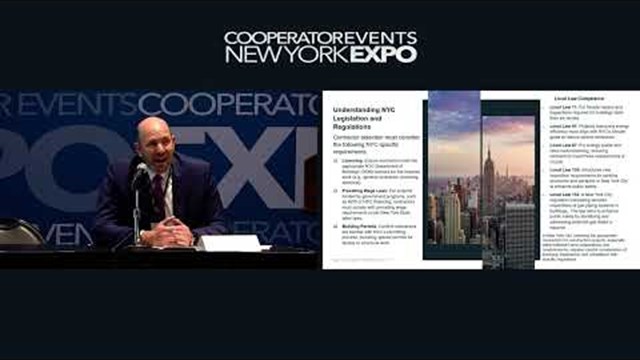
Whether a small service contract for something like snow removal, or a larger initiative like replacing all the windows in a building or HOA, boards and property managers have to exercise extreme due diligence before signing on the dotted line. This approach ensures that biased indemnity clauses aren’t leaving boards – and the unit owners they represent – vulnerable to potentially costly liabilities.
“Indemnification means you are responsible for the liabilities of another,” says attorney David Byrne of Ansell Grimm & Aaron PC, which has offices in New Jersey, New York, and Pennsylvania. “If you need a walkway shoveled or salted after a snowstorm, you hire a contractor. You should try to get the contractor to indemnify you from any damages that result from his actions or inactions.”
Byrne, who limits his practice to the representation of condominiums, community associations, cooperatives, and homeowners’ associations, relates that in many cases indemnification issues occur on smaller contracts, such as the aforementioned snow and ice removal jobs.
“A lot of clients just sign the contract that is given to them by the vendor, which is usually a mistake,” says Byrne. “The vendor creates a contract that is to his or her best advantage, which makes sense from their perspective.” However, Byrne continues, “The general rule is that just because a contract is for a small amount of money, it doesn’t mean it shouldn’t be revised to include provisions that protect the co-op or condo boards and who they represent.”
Insurance Clause
Marc Schneider, managing partner with the New York City-based law firm Schneider Buchel LLP, says an indemnification provision is as important as contractual terms and payments. Indemnification, he says, is not necessarily “insurance” against liability, and that an “insurance indemnification provision” should be included in the contract language. For example, if a contracted roofing company drops a piece of equipment and in so doing damages the building or a unit owner’s personal property, without an insurance indemnity clause, the building’s insurance provider would likely have to fight the claim.
“You want the contractor whose work or presence on your property that caused the damage to occur to be the responsible for handling it – not the board’s insurance company,” says Schneider. “You want the indemnity clause, but also an insurance provision in the contract that requires that the contractor has insurance in place, as well as making sure that the managing agent or the board is listed as an additional insured on the contractor’s policy.”
Over the years, Schneider has successfully added insurance clauses to vendor contracts that have saved his co-op and condo clients the headache and substantial cost of having to fight a claim via its existing insurance policy.
“If you don’t have these insurance provisions, and even if you think the contractor is at fault, without the indemnification provision, the contractor may have insurance but no duty to defend the claim,” he says. “The co-op or condo’s insurance policy would have to take up the claim, defend it, and bring the claim against the contractor. This invariably will increase insurance premiums.”
Since it is likely that the vendor also has a diligent attorney drafting the contract to protect his or her client’s interests, Schneider says both sides of the fence normally start off broad in an attempt to protect respective clients against any possible scenario.
“There are instances where contractor’s attorneys have tried to limit their liability and modify the indemnification provision,” says Schneider. “We represent the board who is hiring the contractor to come on to its property, and who are paying the contractor for a service. We don’t want to have to pick up a claim because someone got hurt as a result of something the contractor did.”
The Washington, D.C.-based architectural firm AIA Trust recently released a white paper entitled “If You Build It, They Will Sue.” The report offered advice from the contractor and subcontractor perspective. The paper recommends that architects use “competent general contractors and subcontractors, with appropriate third-party observation and inspection (especially of the building envelope/waterproofing).”
The white paper also states that “Having a client that will be there at the time of a claim is no guaranty, so past performance and litigation history are worth investigating. Both you and your client should explore all of the various insurance products. Consult your insurance broker. Both you and your client should be united in making sure that HOA and unit owner maintenance requirements are mandated in the project CC&Rs, declarations and manuals.”
“Lastly,” the report concludes, “if defect and deficiency issues do arise, a well-drafted protocol to address the same may lead to a more efficient and economical resolution of the same. The money may be good and the projects plentiful but the risks are real.”
Best Practices
For seasoned managing agents and board members, reviewing contract “language” may be second nature, but more times than not, an attorney’s legal-eagle eye will catch abstruse wording that could leave a board vulnerable, explains attorney Stella Goldstein with the White Plains firm Steinvurzel & Levy Law Group.
“Board-management teams should make sure that there is language within the contract that indemnifies the board, shareholders, lenders, the building, and the managing agent against any personal injury claims, or other lawsuits arising out of the vendor’s, contractor’s or service provider’s negligence, recklessness, willful misconduct, material breaches of contract or violations of any law, sanitation code, or building codes,” says Goldstein. “Ideally, the contract should also expressly include that the indemnification provision survives the termination or expiration of the agreement.”
With respect to indemnification provisions, Schneider says there is no difference between co-op and condo boards. Both entities, he adds, should engage with their respective attorney to draft and/or review vendor contracts so the language protects against liability or related claims.
“Many co-op, condominiums boards and managing agents will receive the insurance certificate from the contractor, but they don’t realize that the insurance certificate is almost worthless without a contract between the two parties that requires that contractor indemnify the board,” says Schneider. He adds that a board that recently held elections and welcomed new members is bound by any contract the prior board signed.
Along with ensuring that contract language includes insurance indemnification, Goldstein explains that there are “red flags” in most contracts. To this end, board-management teams should make sure that their indemnification clauses expressly exclude liability for the co-op or condo’s own negligence. “The failure to incorporate this carve-out may render the entire clause unenforceable, exposing them to unnecessary risk,” says Goldstein. “Detailed insurance provisions are also required to avoid any gaps in coverage, whether policy-related, or a function of statutory effect.”
Schneider adds that the number-one “red flag” is a contractor who refuses to sign a contract that includes an indemnification provision. “If a contractor signs a contract drafted by a good attorney, you generally are not going to have any problems, because they respect the contract and the provisions and they are going to comply with it.”
Whether due to poor oversight or budgetary concerns, many boards fail to vet a contract with an attorney or their management company. As a result, the board is forced to seek legal help after a contract is signed and indemnification issues result, notes Schneider. In some cases, boards can also unwilling violate its own insurance policy.
“I find that most management companies will recommend that a board have a contract prepared by an attorney, since most management companies understand the significance of the issue,” says Schneider. “Boards also have to carefully look over their insurance contracts, because many of these policies require indemnification agreements with contractors. So it is important that a board isn’t violating its own insurance contract. ”
Legal Ramifications
Once a contract is signed, the board is bound to the agreement. If liabilities arise (and they often do), possibly ramifications of not properly vetting, or neglecting to demand indemnification language can result in financial loss. Goldstein explains that examples of “unscrupulous contractors” are myriad, ranging from gross delays and no-shows to wholly negligent performances, to fraudulent activities such as the collection of a down payment and then refusing to perform any work whatsoever.
“Board-management teams must ensure not only that the contract contains an indemnification provision, but also that the indemnification provision is narrowly crafted. In recent years, courts have been quick to determine overly-broad indemnification clauses unenforceable, leaving the co-op or condominium on the hook,” says Goldstein. “Unfortunately, the construction industry often enjoys a poor reputation when it comes to responsibility and accountability.”
Proactive, forward-looking boards are not afraid to invest time and money into indemnification provisions, says Schneider. And since not all attorneys have the same area of expertise or knowledge, he encourages boards and managing agents to seek out those firms who construct and review HOA vendor contracts daily.
“If you have a heart condition, you don’t go see a podiatrist; you see a cardiologist,” says Schneider. “In the same way, not every attorney understands the nuances involved with representing community associations.”
W.B. King is a freelance writer and longtime contributor to The Cooperator.









Leave a Comment